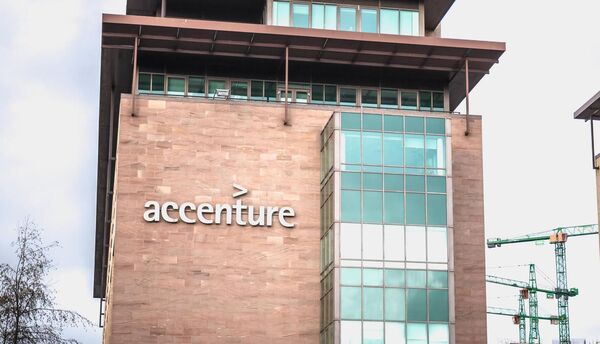IDA chief: Investors see stability and certainty in Ireland

Michael Lohan says despite taking up the CEO's job in a time of significant change, his tenure is going as expected. Picture: Maxwells
The Irish economy is in quite a peculiar place. Emerging as one of the wealthiest in Europe just a few months ago, cracks in Exchequer figures have become increasingly prevalent — with the Organisation for Economic Co-operation and Development (OECD) just this week forecasting a contraction in Ireland’s economy for the first time since the financial crisis.
In a stark shift from GDP growth of 9.4% last year, Ireland’s reliance on a very small cohort of multinationals has manifested in a fall in trade, as pharmaceutical and medical exports continue to weaken.
The OECD also noted Ireland’s “substantial” exposure to global risks, which may further impact exports and Government revenue.
A high interest rate environment — coupled with worldwide uncertainty — has had a notable impact on Irish investment, which dropped by 16.5% in the first three months of this year and only recovered slightly before falling again by 3.7% in the three months ending in September.
Despite this, after six months in the top role, chief executive of the IDA Michael Lohan says he has met with few surprises.
Mr Lohan says his tenure has been going as expected, despite taking up the job in a time of significant change.
Before becoming head of Ireland’s Foreign Direct Investment (FDI) Agency, Mr Lohan’s time in the IDA spanned just short of 20 years, joining in 2003 and working up the ladder to where he is now.
He left his position as head of life sciences and talent, transformation, and innovation last April, before assuming the role of chief executive officer.
Contrary to the OECD’s view, he doesn’t see the same threat in global uncertainty — telling the that when investors come to Ireland “they actually see a lot of stability and certainty”, with home-grown issues posing more challenges than international ones.
“We have a housing shortage,” he said.
“I think the response to Housing For All is making traction, and what we now need to do is excel in that and continue to deliver.”
As Mr Lohan transitioned into the top role, Ireland’s tech sector was in the midst of widespread layoffs which have since extended across the State’s consulting, food, and pharmaceutical industries.

It is estimated that more than 3,000 tech workers have lost their jobs in the past year, with the closure of Nestlé’s Limerick food plant and cuts across Accenture compromising a further 1,700 employees alone.
Mr Lohan said the cuts were “undoubtedly” difficult.
“In any given year, you are going to see the cut and thrust of international business.
“That was somewhat multiplied by the reset that happened in technology.
“Have we seen the largest percentage? I think we have. Have we seen them all? Probably not.”
As Mr Lohan views it, firms that have cut Irish staff are now stabilising and looking to grow once more. “We welcome that and want to see that translate in 2024.”
“We can’t forget that all companies and enterprises have a dependency on global markets.
“Inflation remains stubbornly high for everyone.
Despite these challenges, in the first six months of this year, the IDA won 139 investments — translating to an employment potential of more than 12,000 jobs.
Reflecting on his tenure so far, Mr Lohan celebrates several of these clients.
The big one is Analog Devices and its €630m investment in its European regional headquarters in Limerick, which Mr Lohan says sets Ireland “very much apart” when it comes to the growing semiconductor industry.

He is also quick to note Qualcomm’s multi-million expansion in its Cork city research and development facility, along with the “significant investments” in Limerick with Eli Lily, Abbott in Kilkenny, and Dexcom in Galway.
While it wasn’t the largest, one of the investments won this year stood out for a different reason.
A month into Mr Lohan’s current role, the IDA announced that Chinese fast-fashion retailer Shein had officially opened its new EMEA headquarters in Dublin city centre — with the CEO saying Ireland was an “ideal location”, in terms of talent and resources, from which Shein can grow and expand.
The announcement was quickly met with a backlash, with the IDA reminded of the retailer’s contribution to the climate crisis — through its use of cheap synthetic fossil-fuel fibres, dyes, plastics, and microplastics to make clothes sold at extremely low prices.

The IDA said that it “received assurances” relating to Shein’s “commitment to environmental sustainability”, with the retailer advising the agency that they are “committed to respecting human rights and adhering to local laws in each market they operate in, as well as having “zero tolerance towards forced labour”.
Asked how the IDA factors the ethical structure of a business into its investment decisions, Mr Lohan explained: “We look at it across a number of factors.”
“We look at their financial position, their organisation structure, their leadership, their track record, and [we look at the company] in terms of sustainability. We want to make sure that we are bringing in companies that are not just financially stable, but also have a green ethos.”
Asked if Shein fits this description, Mr Lohan told the : “When we looked at this, we said to ourselves, they’re actually establishing a centre here which is all about compliance. We welcome that because that is absolutely necessary throughout the supply chain.
“So, in that context, I think that they have — on the company side —made very strong commitments.
“My view is we should be aiding and assisting and, if you want to call it, promoting companies to put that structure in place.”
“Undoubtedly, they have recognised a change is needed and they are putting a structure in place to do that,” Mr Lohan said.
Both the CEO and the IDA reiterate that, while they have a responsibility in this area, these issues ultimately come down to the relevant regulator.
The regulator’s job is to keep companies in check and make recommendations.
So, what happens when an IDA-backed company is caught out by the authorities?
In September of this year, TikTok was fined €345m for violating child privacy rules by the Data Protection Commission.

The Chinese video-sharing platform — which established itself in Ireland in 2020 — has been heavily backed by the IDA, with the agency celebrating the company’s presence here as a “success story”.
Speaking on the IDA’s support for TikTok and its subsequent fine, Mr Lohan said that if something “warrants the regulator’s attention, it should get the regulator’s attention”.
However, he noted the unique environment in which the company operates,
"That’s where we are going to see these challenges and collisions, between practices established in one area and the regulation.”
The IDA is firmly eyeing the future, with big plans for 2024. Ahead of the release of its annual financial results this month, Mr Lohan says he has plenty to look forward to as he braces for his first full year as CEO.
He notes the continuation of relationships with clients and companies, pipeline opportunities in research and innovation, and increased digitalisation, as well as further work in sustainability.
“These areas excite me because we have a very unique proposition in Ireland, but we also have a very unique and enviable position," he said.
"The world’s largest and most innovative multinational companies have chosen Ireland as their home, or a big part of their supply chain. That is coupled with the indigenous companies that we have here, so we have the opportunity to set the next level of generational change in terms of research, innovation, and prosperity for the people.”








